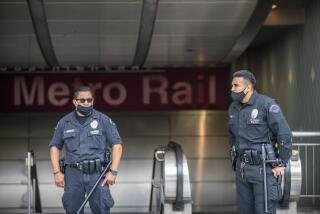MTA to Make Offer Directly to Mechanics
- Share via
The strike that has left about 400,000 riders in the county without bus and train service appears likely to drag on for weeks, given the Metropolitan Transportation Authority’s decision to call off talks.
In walking away from the bargaining table Monday, MTA Chief Executive Roger Snoble said that talks had reached an impasse and that his agency would bypass the mechanics union leadership and take a contract offer directly to workers.
But union leadership and several workers said Tuesday that the move had further alienated them, because declaring an impasse legally opens the door for the MTA to impose a contract and hire replacement workers. MTA officials said they had no intention of doing either, but that did nothing to soothe the fears of striking workers.
Neil Silver, president of the mechanics union, said that the agency was bargaining in bad faith and that there was no end in sight to the walkout.
“This strike will end when the MTA damn well feels like it,” Silver said. “And it looks like we’re a long way off from that.”
The other side has also become pessimistic. MTA officials say Silver is the roadblock preventing a deal. They argue that he is motivated in part by a need to show his roughly 2,800 active and retired members that he won’t back down before a union election on his presidency next month.
The MTA, by taking a “last, best and final” offer to the membership, essentially is trying to go around Silver, hoping union members will agree to the agency’s offer, particularly on the core issue of health benefits.
The union manages a $17-million health-care fund that the MTA pays for. The fund is now insolvent, and the two sides differ as to why. The union says soaring insurance premiums caused the problem. The MTA says union mismanagement is largely to blame.
The MTA offer, due to be made available to rank-and-file union members today by mail and at picket lines, probably will be a nearly five-year contract offering an immediate infusion of $4.7 million to the fund, a 5% wage hike over the course of the contract, a gradual increase from $1.4 million to $1.9 million in the MTA’s monthly contributions to the fund, and joint control of the fund’s administration.
“What we want is a vote,” said MTA spokesman Marc Littman. “We want to urge the members to urge Neil to give them a vote, because we are offering a good deal.”
Silver, while not bound to put the contract before his workers, said Tuesday that he would talk to fellow union leaders before deciding whether to allow a vote. He said the MTA’s offer does not go far enough to protect the union health fund from insurance costs that are expected to keep spiraling upward over the next five years.
Silver said that the MTA needed to make an immediate contribution of “at least $6 million” to make the fund solvent and that monthly contributions needed to immediately increase to more than $2 million a month.
Part of the problem in the negotiations, Silver said, came from his distrust of the accounting methods used by the MTA in determining its offers.
“They are being cute with the numbers,” he said, before railing against the MTA, which has a long history of financial missteps. “Creative accounting, that is something they are very good at.”
On the picket lines Tuesday, opinions about the agency’s latest move were mixed. The lines, set up at MTA properties across the county, are composed mostly of mechanics and drivers. The drivers, who are honoring the picket lines, also are struggling with the MTA over a contract.
Most said they were angered by the MTA’s most recent action. Armando Urena, a shop steward at a bus yard near downtown Los Angeles, said the agency was trying to “divide and conquer” the union by going around its leadership.
“What they are doing is completely unethical. We have a leadership that we support, and they are the ones that we have elected to do the bargaining,” he said. “I’m sure nobody is going to support what the MTA is doing.”
But at several bus yards, some workers said they wanted the chance to vote.
“A lot of people are going to be struggling,” said veteran mechanic Anthony Johnson, 46, noting that strikers will miss their first paychecks this week. “At this point and time, it seems like it would only be fair for us to see what the MTA is presenting and have a voice.”
State Sen. Kevin Murray (D-Culver City), chairman of the Senate Transportation Committee, said he was extremely frustrated by the MTA’s decision to declare an impasse.
“It’s discouraging, because I just don’t see any progress, and this doesn’t help,” he said. “Nobody is offering anything in the way of creative solutions.... The whole thing is stuck.”
One solution could be to have an outside party try to solve the dispute through arbitration, said Daniel Mitchell, a UCLA professor who specializes in labor issues. He suggested that an arbitrator agreed upon by both sides could be brought in to examine the health-care issue while the mechanics go back to work.
“Both sides would bind themselves to whatever decision is made by the [arbitrator] while the buses and trains start rolling again,” Mitchell said. “It would break the logjam .... Both sides are sure that they are right on this. You’d think that if that were true, they could easily convince an outside person of the merits of their argument. Without a neutral party there’s little end in sight.”
More to Read
Sign up for Essential California
The most important California stories and recommendations in your inbox every morning.
You may occasionally receive promotional content from the Los Angeles Times.











